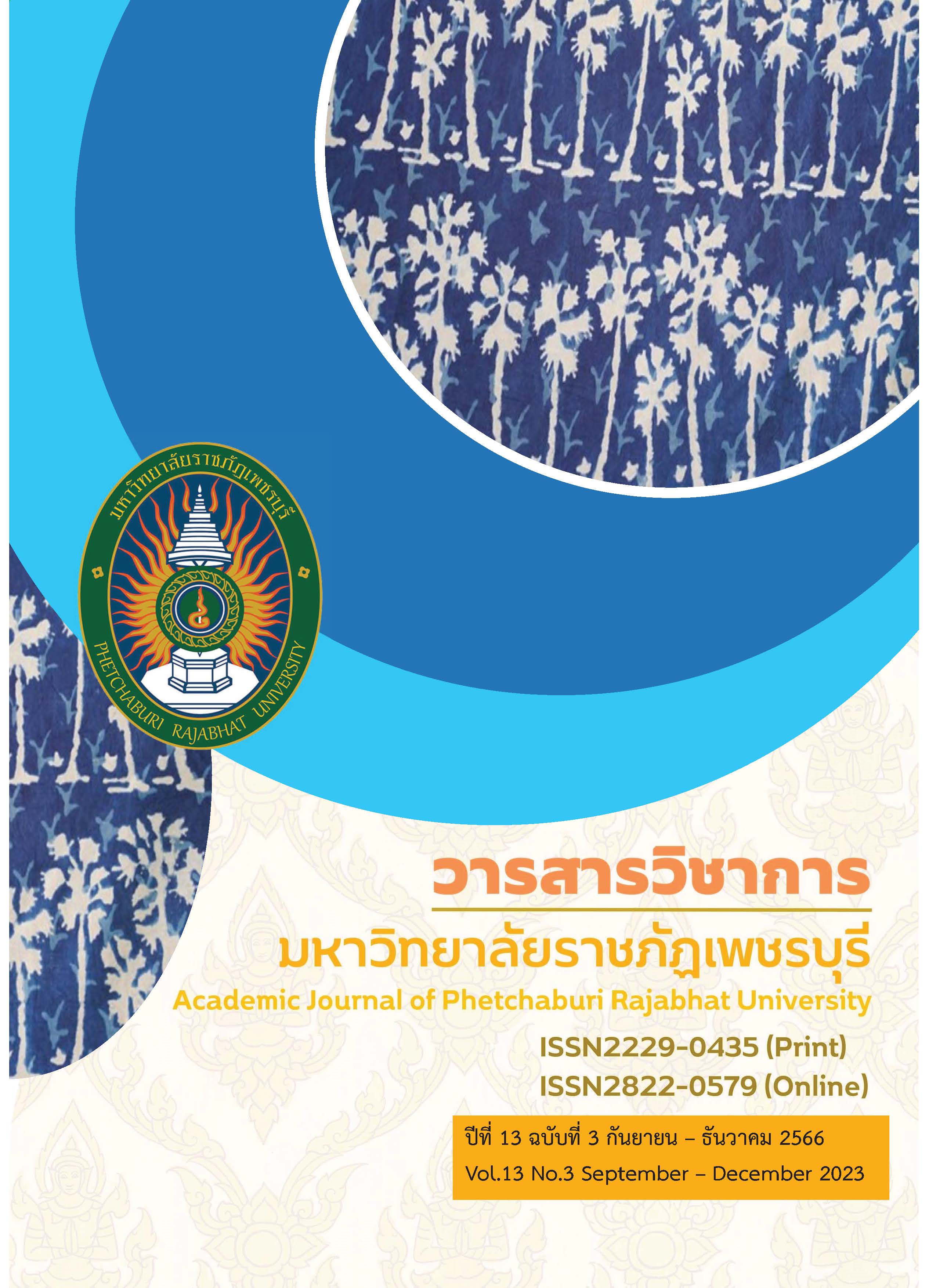การส่งเสริมทักษะการเรียนคำศัพท์ภาษาอังกฤษของนักศึกษามหาวิทยาลัยราชภัฏเพชรบุรี ด้วยแอปพลิเคชันทบทวนแบบเว้นระยะ (อังคิ)
Main Article Content
บทคัดย่อ
งานวิจัยนี้มีจุดมุ่งหมายเพื่อศึกษาประสิทธิภาพของแอปพลิเคชันทบทวนแบบเว้นระยะในการส่งเสริมทักษะการเรียนคำศัพท์ภาษาอังกฤษของนักศึกษาไทยที่เรียนภาษาอังกฤษในฐานะภาษาต่างประเทศในมหาวิทยาลัยแห่งหนึ่งในภูมิภาค กลุ่มตัวอย่างเป็นนักศึกษาจำนวน 30 คน งานวิจัยนี้ใช้วิธีการวิจัยเชิงปริมาณและเชิงคุณภาพ สถิติที่ใช้ในการวิเคราะห์ข้อมูลคือ สถิติเชิงพรรณนา ได้แก่ ร้อยละ ค่าเฉลี่ย และส่วนเบี่ยงเบนมาตรฐาน ข้อมูลเชิงคุณภาพใช้วิธีวิเคราะห์เชิงเนื้อหา ผลการวิจัยพบว่า 1) การฝึกทักษะการจำคำศัพท์ภาษาอังกฤษด้วย
แอปพลิเคชันทบทวนแบบเว้นระยะ มีประสิทธิภาพ 88.23/87.72 2) คะแนนความก้าวหน้าร้อยละ 34.47 3) นักศึกษาเห็นด้วยว่าการฝึกจำคำศัพท์ภาษาอังกฤษด้วยแอปพลิเคชันทบทวนแบบเว้นระยะมีประสิทธิภาพ และ 4) นักศึกษามีความคิดเห็นเชิงบวกต่อประสบการณ์การฝึกจำคำศัพท์ภาษาอังกฤษด้วยแอปพลิเคชันทบทวนแบบเว้นระยะ
Article Details

อนุญาตภายใต้เงื่อนไข Creative Commons Attribution-NonCommercial-NoDerivatives 4.0 International License.
บทความนี้ยังไม่เคยลงตีพิมพ์ในวารสารใดมาก่อน และไม่อยู่ระหว่างการพิจารณาของวารสารอื่น
บทความที่ลงพิมพ์เป็นข้อคิดเห็น/แนวคิด/ทัศนคติของผู้เขียนเท่านั้น หากเกิดผลทางกฎหมายใดๆที่อาจ
เกิดขึ้นจากบทความนี้ ผู้เขียนจะเป็นผู้รับผิดชอบ และบทความนี้เป็นลิขสิทธิ์ของวารสารเท่านั้น
เอกสารอ้างอิง
Schmitt, N. Instructed second language vocabulary learning. Language Teaching Research 2008; 12: 329-363.
Horst, M., & Cobb, T. Second language vocabulary acquisition. The Canadian Modern Language Review 2006; 63: 1-12.
Laufer, B. Comparing focus on form and focus on FormS in second language vocabulary learning. Canadian Modern Language Review/La Revue Canadienne Des Langues Vivantes 2006; 63: 149-166.
Hacking, J.F & Tschirner, E. The Contribution of Vocabulary Knowledge to Reading Proficiency: The Case of College Russian. Foreign Language Annals 2017; 50(3): 500-518.
Karpicke, J.D., & Bauernschmidt, A. Spaced Retrieval: Absolute Spacing Enhances Learning Regardless of Relative Spacing. Journal of Experimental Psychology 2011; 37(5): 1250-1257.
Nakata, T., & Webb, S. Does Studying Vocabulary in Smaller Sets Increase Learning? The Effects of Part and Whole Learning on Second Language Vocabulary Acquisition. Studies in Second Language Acquisition 2016; 38: 523-552.
Cull, W. Untangling the benefits of multiple study opportunities and repeated testing for cued recall. Applied Cognitive Psychology 2000; 14(3): 215-235.
Nation, I. S. P. Learning vocabulary in another language. New York: Cambridge University Press; 2001.
Bahrick, P., Bahrick, H., Bahrick, L., & Bahrick, A. Maintenance of foreign language vocabulary and the spacing effect. Psychological Science 1993; 4(5): 316-321.
Year, J. Korean speakers’ acquisition of the English ditransitive construction: The role of input frequency And Repetition [dissertation]. Teacher’s College Columbia University; 2009.
Miles, S. W. Spaced vs. massed distribution instruction for L2 grammar learning. System 2014; 42(2): 412-428.
Cameron, L. Teaching languages to young learners. Cambridge: Cambridge University Press; 2001.
Atkinson, R. C, & Shiffrin, R. M. Human memory: A proposed system and its control processes. In K. W. Spence & J. T. Spence (Eds.). The psychology of learning and motivation. New York: Academic Press; 1968: 89-195.
Hatch, E. & Brown, C. Vocabulary, semantics, and language education. Cambridge: Cambridge University Press; 1995.
Kapler, I.V., Weston, T., & Wiseheart, M. Spacing in a simulated undergraduate classroom: Long-term benefits for factual and higher-level learning. Learning and Instruction 2014; 36: 38-45.
Webb, S. The effects of repetition on vocabulary knowledge. Applied Linguistics 2007; 25(1): 46-65.
Oxford, R. L. Language learning strategies: What every teacher should know. Boston: Heinle & Heinle; 1990.
Weimer-Stuckmann, G. Second Language Vocabulary Acquisition: Spacing and Frequency of Rehearsals [Master Thesis]. University of Victoria; 2009.
Lewis, M. Learning in the lexical approach. In M. Lewis (Ed.). Teaching Collocation: Further Developments in the Lexical Approach. London: Language Teaching Publications; 2000:155-184.
Nakata, T. and Suzuki, Y. Effects of massing and spacing on the learning of semantically related and unrelated words. Studies in Second Language Acquisition; 2018: 1-25.


